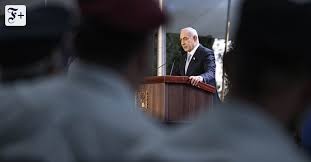
In May, the International Criminal Court (ICC) chief prosecutor, Karim Khan, announced he would seek arrest warrants for Israeli Prime Minister Benjamin Netanyahu and Defense Minister Yoav Gallant for the war crime of starving Palestinian civilians in Gaza. He also sought warrants for three senior Hamas commanders for atrocities and hostage taking on October 7.
In July, just as the Israeli media reported that approval of the warrants for the Israelis was expected shortly, the German government announced that it would challenge the move. That last-ditch stalling effort epitomizes the German government’s deeply misguided deference to the Israeli government regardless of its unlawful starving and bombing of Palestinian civilians in Gaza.
The German government has not announced the rationale, but reports indicate that it intends to advance a theory that has legal experts rolling their eyes. The ICC is guided by what is known as “the principle of complementarity,” meaning it is supposed to defer to conscientious national investigations and prosecutions. The German government apparently plans to argue that the ICC should refrain from issuing arrest warrants because the Israeli government cannot be expected to investigate possible war crimes while the war is ongoing.
Really? Rather than trying to stop war crimes that are underway, prosecutors are supposed to wait, pursuing criminality only retrospectively? The German government would be hard-pressed to find any serious military prosecutor who believes that.
The selectivity of the German government’s approach also stands out. Berlin didn’t dare to advance this novel theory when the ICC issued an arrest warrant for Russian President Vladimir Putin, although his war in Ukraine is far from over.
Moreover, the Israeli government is showing anything but a conscientious effort to investigate its alleged war crimes, as Israeli human rights groups have repeatedly shown. Israel has no history of prosecuting senior officials for war crimes. The ICC prosecutor twice visited the region and warned that the government should abandon its starvation strategy for Palestinian civilians, yet Netanyahu’s far-right government neither ended its obstruction of much of the food and other aid that humanitarian organizations were trying to deliver to Gaza, nor investigated the allegations that Khan was making.
To make matters worse, the Guardian and Israel’s +972 Magazine revealed that Israel’s Mossad spy agency had threatened the prior ICC prosecutor, handed her an envelope stuffed with cash, mounted a sting operation against her husband, and secretly monitored her communications. None of that suggests a conscientious effort to investigate senior Israeli officials’ alleged war crimes.
If at some point Israel were to open a serious investigation, it could always invoke the principle of complementarity then. But why would the German government, historically one of the most important supporters of the ICC, suggest now that the ICC should await some future Israeli investigation when there is no evidence suggesting that such an investigation will ever occur?
To justify its extraordinary defense of the Israeli government, the German government frequently invokes Staatsräson – the responsibility to make amends for the Holocaust. On a personal level, I appreciate the intention. As a 12-year-old boy, my own father fled Frankfurt with his Jewish family in July 1938. I grew up with stories of life under Nazi rule. But the German government’s implementation of Staatsräson to shield Israeli officials from accountability conflicts with its longstanding and important support for international law, which today is under serious threat from the world’s autocrats.
This misuse of Staatsräson also diminishes the safety of Jews. Broadly speaking, two reasons are offered for why the Nazis persecuted Jews: one, because Jews were relatively weak; the other, because international human rights standards against the persecution of Jews were weak.
There is an element of truth in each, but the Netanyahu government subscribes only to the first. It wants a strong state of Israel, which is understandable, but when it defends Israel, it frequently disregards the lives and well-being of Palestinian civilians, as it is unlawfully doing in Gaza.
That one-dimensional approach undermines respect for human rights. If there is a human rights exception for Palestinians today, there inevitably will be one for Jews (and others) tomorrow.
At the very least, that indifference to human rights jeopardizes the half of the world’s Jews who live outside of Israel, including in Germany. They need a strong human rights system, especially as antisemitism surges. But Netanyahu does not seem to care much for Jews who have not emigrated to Israel, particularly because so many are appalled by his conduct in Gaza, let alone by his government’s endless construction of illegal settlements in the occupied West Bank and East Jerusalem.
In Germany, some government officials, media institutions, political parties across the spectrum, and important bodies such as the Zentralrat der Juden and the antisemitism commissioner are quick to label as antisemitic anyone who criticizes Israel’s conduct regardless of how heinous it is. That misuse of allegations of antisemitism cheapens the concept at a moment when a strong defense against antisemitism is urgently needed.
Ignoring human rights standards arguably also undermines the safety of Jews inside Israel. As shocking and horrible as the atrocities of October 7 were – clear war crimes and crimes against humanity – Hamas is the B Team when it comes to threats against Israel. A far more dangerous force is Hezbollah, in southern Lebanon, which has tens of thousands of rockets and missiles trained upon Israel, many precision-guided – enough quickly to overwhelm Israeli defenses and devastate much of the country. A Hezbollah attack on Israeli military forces would be bad enough. A wider attack harming civilians without regard for international law, as Israel is doing now in Gaza, would be catastrophic.
A German Staatsräson should be two-dimensional. Yes, the German government should help ensure that Israel is strong. But it should also press the Israeli government to respect human rights. When Israel ignores those legal standards, the German government should promote what is good for Jews – a strong system of human rights – not blindly defend whatever the Israeli government of the moment does.
It is time for a course correction, for a different understanding of Staatsräson. Last week, the new British government abandoned its predecessor’s similarly baseless effort to delay the arrest warrants for Netanyahu and Gallant. The German government as well should let the ICC proceedings take their course, not concoct cheap defenses for indefensible Israeli government conduct.
This article was written by Kenneth Roth and published by Frankfurter Allgemeine Zeitung in August 2024. You can read the full article in German on faz.net.
